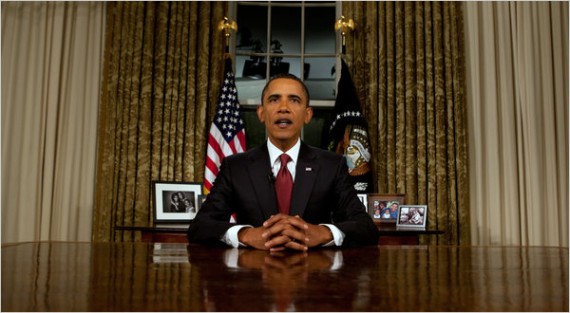Candidate Obama vs. President Obama On Presidential Signing Statements
Once again, President Obama has ignored Candidate Obama's promises to reign in the Presidential powers assumed by George W. Bush.
As Steven Taylor noted this morning, President Obama issued a Presidential Signing Statement when he signed the FY2011 budget bill stating that he intended to ignore Congresses explicit instruction that no Federal funds be used to fund so-called Presidential “czars.” This isn’t the first signing statement that President Obama has issued. In fact, counting the one issued yesterday, he’s issued 17 such statements since he became President in January 2009. While this is far fewer than President George W. Bush, who had issued 60 signing statements by this point in his Presidency, it is a marked departure from the promises that Senator Barack Obama made as a Presidential candidate.
For example, in October 2007 he said this to the Boston Globe:
4. Under what circumstances, if any, would you sign a bill into law but also issue a signing statement reserving a constitutional right to bypass the law?
Signing statements have been used by presidents of both parties, dating back to Andrew Jackson. While it is legitimate for a president to issue a signing statement to clarify his understanding of ambiguous provisions of statutes and to explain his view of how he intends to faithfully execute the law, it is a clear abuse of power to use such statements as a license to evade laws that the president does not like or as an end-run around provisions designed to foster accountability.
I will not use signing statements to nullify or undermine congressional instructions as enacted into law. The problem with this administration is that it has attached signing statements to legislation in an effort to change the meaning of the legislation, to avoid enforcing certain provisions of the legislation that the President does not like, and to raise implausible or dubious constitutional objections to the legislation. The fact that President Bush has issued signing statements to challenge over 1100 laws – more than any president in history – is a clear abuse of this prerogative. No one doubts that it is appropriate to use signing statements to protect a president’s constitutional prerogatives; unfortunately, the Bush Administration has gone much further than that.
Then, in May 2008, he said this at campaign rally:
Both those statements seem rather emphatic to me and, of course, it isn’t the first time that Barack Obama has essentially ignored a “I won’t be like George Bush” promise he made during the campaign. He did the same thing just a few weeks ago when he authorized the use of force in Libya without seeking Congressional approval. So, this is really nothing new when it comes to this President.
Nor should we really be all that surprised. It’s the natural order of things that once an institution accumulates power, it seldom gives it up. When Barack Obama succeeded George W. Bush, he inherited the enhanced powers that the Bush Administration had assumed for itself, largely in the wake of the September 11th attacks. In virtually every case, Candidate Obama criticized that assumption of power. In virtually every case, President Obama has retained that power, used it, and defended its use in Court. In fact, this President took the Bush Administration one step further by claiming for himself the right to issue an assassination order against an American citizen without any form of judicial review or Congressional inquiry. The power of the Presidency, which was enhanced under George W. Bush, has been enhanced even further under Barack Obama, and separation of powers has suffered as a result.
Update: In a separate post, I talk about the Constitutional issues raised by this signing statement.







“President Obama issued a Presidential Signing Statement when he signed the FY2011 budget bill stating that he intended to ignore Congresses explicit instruction that no Federal funds be used to fund so-called Presidential “czars.””
Where in is signing statement does it say that?
Read the statement:
https://www.outsidethebeltway.com/then-veto-the-bill-signing-statements/
Yeah, and?
I see ABC spokes clown Jake Tapper repeating your questionable claim at that link.
I don’t see where President Obama says “he intended to ignore Congresses explicit instruction that no Federal funds be used to fund so-called Presidential “czars.””
It’s right there, in plain English. Unless, of course, you’re one of the few still drinking the Obama Kool-Aid
In other words, he’s going to ignore Congress. He’s a hypocrite
If “It’s right there, in plain English” why are you using the phrase “In other words?”
You either understand this, or you’re willfully blind
There are non so blind as those who *will* not see…..
Although, I will point this out, the bolded statements:
don’t appear to deal with this particular case of restricting how the President spends his budget on advisors…they aren’t instructions that he has to to do something [a postive instruction, or command to actively engage in an act], and the President is still accountable, as the budget restrictions don’t affect the President being accountable to his decisions that he makes after advisement….
Just sayin’
And I do think that he could have certainly made a case for how Congress is overstepping their powers by vetoing the budget…..but that wouldn’t be politically expedient for passing the budget. It would do more harm than good in the immediate picture…..
Doug is just super-excited about what seems to be an opportunity to call Obama a hypocrite. It just resonates so well with his self-image of the principled, crusading political analyst.
Too bad it is such an obvious stretch. Obama very explicitly justified the use of signing statements in principle, as he was criticizing Bush’s excessive use of them. And he criticized Bush for raising spurious constitutional issues – and with this case, there seems to be a very strong argument against the constitutionality of the provisions.
It is, once again, extremely lazy argumentation to pretend that Obama is violating the standards he laid out. He never denounced signing statements in principle – he denounced the abuse of the privilege. And he makes a compelling case that this example is not such an abuse.
Well, I’ll just repost my comment from Steven Taylor’s post on the same topic, with a small edit:
“Steven, I’m afraid you and Tapper [and Doug -ed.] have fallen for a little bit of GOP-orchestrated political theater.
The signing statement reads to me as the President asserting the basic right to receive advice and to delegate authority within the executive branch, and rejecting any precedent the GOP might think it’s setting here. Nowhere does it state that Obama is going to go around Congress’ back somehow to fund these positions, which are already vacant. Tapper’s characterization is highly misleading.”
I think what it is is that Doug and Steven have been a little too critical of the GOP lately, and this is an opportunity to hit Obama over some nonsense and thus score points for “balance.”
Admittedly, my memory isn’t great. But when did President Bush invade another country without Congressional approval?